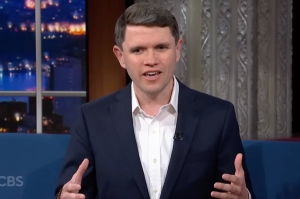The power of 'no:' Finding our way back to a deeper faith, lasting friendships

No is, by definition, a negative word. When we hear it, we conjure up images of rejection and denial. For years, I believed I couldn’t say “no” to anyone or anything. If someone asked, I said yes. But before I knew what happened, I was spiritually, emotionally, and physically drained. My expectations for myself and for my ministry were unrealistic.
And I know I am not alone. Barna Group’s recent survey on the well-being of pastors found that 42% are “seriously considering” leaving full-time ministry. The reasons vary, but at the top are the immense stress of the job (56%) and feelings of loneliness and isolation (43%). When William Howard Taft handed over the office of President of the United States to Woodrow Wilson, he warned, “This is the loneliest place in the world.”
And it’s not just leaders who are struggling with loneliness — we all are. A study by the Survey Center on American Life found that a whopping 49% of those polled reported having fewer than three close friends — a nearly doubled increase from 1990, when the number was 27%. Add to this the fact that 12% of those interviewed claimed to have no friends — a four-fold increase from 30 years ago.
Why do I share these stats on loneliness? It might seem that the antidote to loneliness would be to say “yes” to more people — but that is rarely the case. The sooner we can say “no” to the following three things, the more quickly we will say “yes” to faith and friendship.
1. Everything
I like how the 2011 NIV translation seems to put a cap on our efforts in Philippians 4:13: “I can do all this through him who gives me strength” (italics mine). Other renditions offer everything or all things. Too many of us, when we read this type of passage, may think that as long as we stay focused on God, we can say “yes” to every good thing that comes our way. But we can’t, and when we try, sooner or later, we will burn out. We burn bridges with loved ones as we spend less time with them. We burn creativity and joy as we live in the tyranny of the urgent. And we burn pathways to unexpected Spirit-led encounters as we have no margin to say yes to an urgent prompting of the Spirit.
2. Attempting to fix people
If we are honest, many of us believe that we can fix people when they are hurting or doing wrong. We may spiritualize the language: “I am coming alongside/walking alongside them.”But the bottom line is that, especially as church leaders, we believe that is part of our job description. We are to be a place of healing and a place of unity, after all!Our intentions are good, but our capacities are limited. I have found, over and over, that my capacity to fix a leaking sink is much greater than my capacity to change others. God certainly calls us to do what we can to help people, but we must know the limits of what we can and can’t do. God is omnipotent; we are not.
3. Comparing yourself with others
Yes, church leaders need to hear this, especially in an age of social media where the highlight reel is on full blast. We face the constant comparison of numbers and building and budgets. But post-COVID, there are new temptations to compare ourselves to others: how lively and innovative our digital footprint is or how broad our ability to care for the mental health crisis in our churches is, for example. A strong digital presence and healing ministries are wonderful, but only if they exist within the scope and capacity of what our church can do.
When I was a kid, I watched a lot of basketball on TV. After watching many games, I would head outside to play. I soon realized, however, that I was no Michael Jordan. Neither, much to my chagrin, was I as good as other kids my age! I had to look squarely at how God had made me, do my best with what He had given me, and then be okay with that. The burnout we are seeing in pastors and church leaders often stems from our human tendency to compare ourselves to others. The Apostle Paul said it well: “We do not dare to classify or compare ourselves with some who commend themselves. When they measure themselves by themselves and compare themselves with themselves, they are not wise” (2 Cor. 10:12). When we say “no” to comparison, we say “yes” to seeing how we can engage with what God has put in front of us.
Concluding thoughts
When we learn to pause and turn our default “yes” into a few more “no’s”, we make room to hear God and respond to what He is asking us to do. Every time we say “no” to attempting to fix everyone, we say “yes” to trusting that the boundaries we set will allow others to be part of someone’s healing journey. And every time we say “no” to comparing ourselves to others, we say “yes” to fully embracing that we are uniquely made in God’s image. We aren’t carbon copies of 100 others — God has created us, and those under our care, for a specific purpose.
All of these “no’s” add up to an ability to say “yes” to entering into a deeper relationship with God and to spending more time with those He has called us to serve in community with. “No” is not a negative word. It’s a neutral, and sometimes life-altering, decision to choose faith and friendship as our highest priorities.
Dr. Sean McGever is an Area Director for Young Life, and an adjunct faculty at Grand Canyon University.



























